Automation engineers play a key role in streamlining processes and enhancing productivity. They design, program, simulate, and test automated machinery and processes to complete exact tasks. Their work ensures that systems operate efficiently and reliably, reducing the need for human intervention.
Skills required for an automation engineer include proficiency in programming languages such as Python, Java, or C++, as well as knowledge of control systems and hardware. Additionally, they must possess strong analytical skills and the ability to troubleshoot and solve complex problems.
Candidates can write these abilities in their resumes, but you can’t verify them without on-the-job Automation Engineer skill tests.
In this post, we will explore 9 essential Automation Engineer skills, 10 secondary skills and how to assess them so you can make informed hiring decisions.
Table of contents
9 fundamental Automation Engineer skills and traits
The best skills for Automation Engineers include Programming, Scripting, Control Systems, Testing Frameworks, Networking, Data Analysis, Version Control, API Integration and Debugging.
Let’s dive into the details by examining the 9 essential skills of a Automation Engineer.
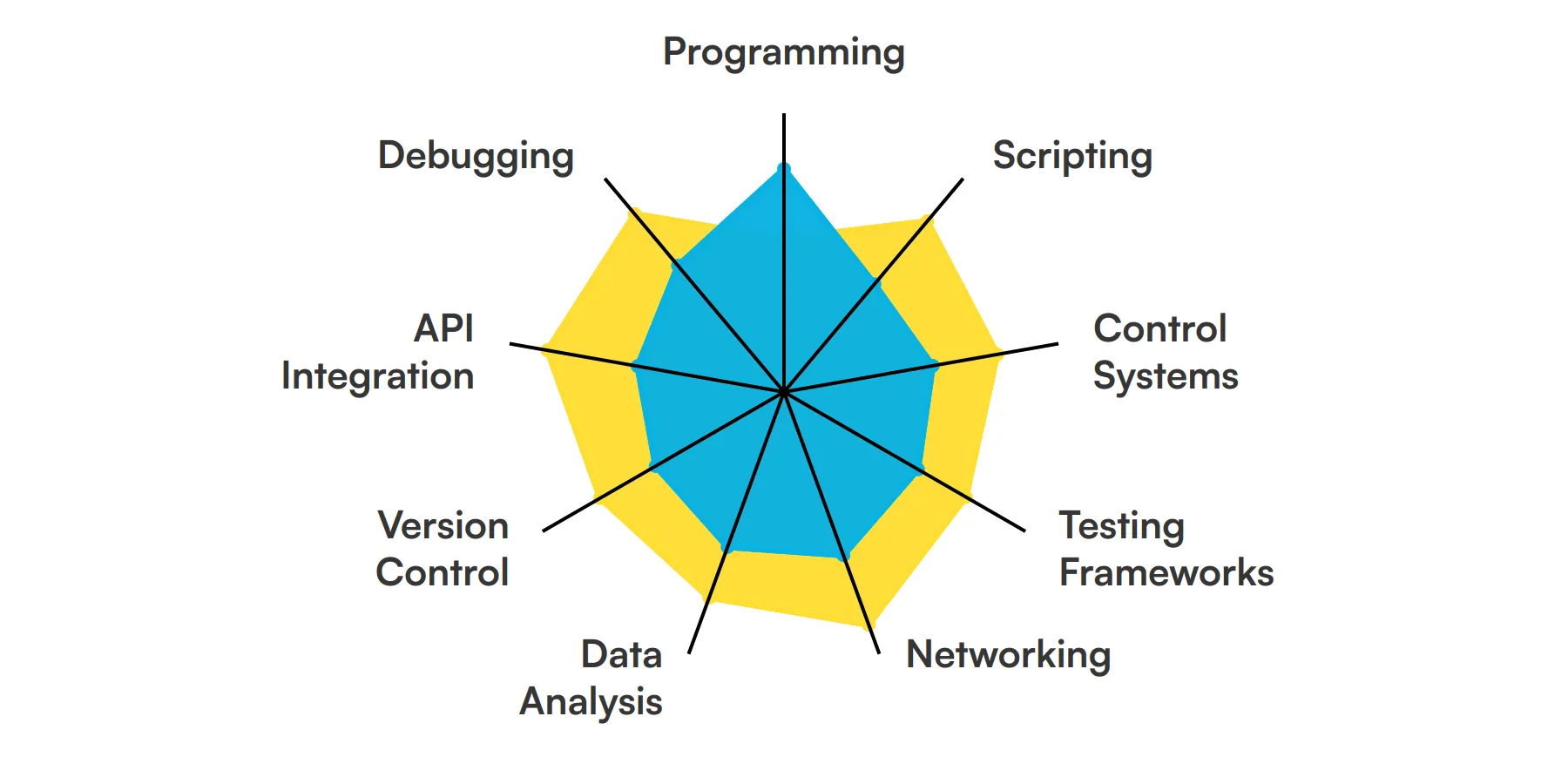
Programming
Automation engineers need strong programming skills to write scripts and develop software that automates tasks. Languages like Python, Java, and C# are commonly used in automation projects.
For more insights, check out our guide to writing a Software Developer Job Description.
Scripting
Scripting is crucial for creating automated processes. Engineers often use shell scripts, PowerShell, or batch files to automate repetitive tasks and streamline workflows.
Control Systems
Understanding control systems is key for an automation engineer. This includes knowledge of PLCs, SCADA systems, and other industrial control systems used to manage and automate machinery and processes.
Testing Frameworks
Familiarity with testing frameworks like Selenium, JUnit, or TestNG is important. These tools help in automating the testing of software applications, ensuring they function correctly without manual intervention.
Check out our guide for a comprehensive list of interview questions.
Networking
Networking knowledge is essential for setting up and maintaining the communication between different automated systems. This includes understanding protocols, IP addressing, and network troubleshooting.
Data Analysis
Automation engineers often need to analyze data to optimize processes. Skills in data analysis tools and techniques help in making informed decisions based on the performance metrics of automated systems.
For more insights, check out our guide to writing a Data Analyst Job Description.
Version Control
Using version control systems like Git is important for managing changes in code and scripts. It allows automation engineers to collaborate effectively and maintain a history of their work.
API Integration
APIs are used to connect different software systems. Automation engineers need to understand how to integrate APIs to enable seamless communication between automated tools and applications.
Check out our guide for a comprehensive list of interview questions.
Debugging
Debugging skills are necessary to identify and fix issues in automated systems. This involves using debugging tools and techniques to troubleshoot and resolve problems efficiently.
10 secondary Automation Engineer skills and traits
The best skills for Automation Engineers include Database Management, Cloud Services, Machine Learning, Cybersecurity, Project Management, User Interface Design, Technical Writing, Robotics, DevOps and Human-Machine Interface.
Let’s dive into the details by examining the 10 secondary skills of a Automation Engineer.
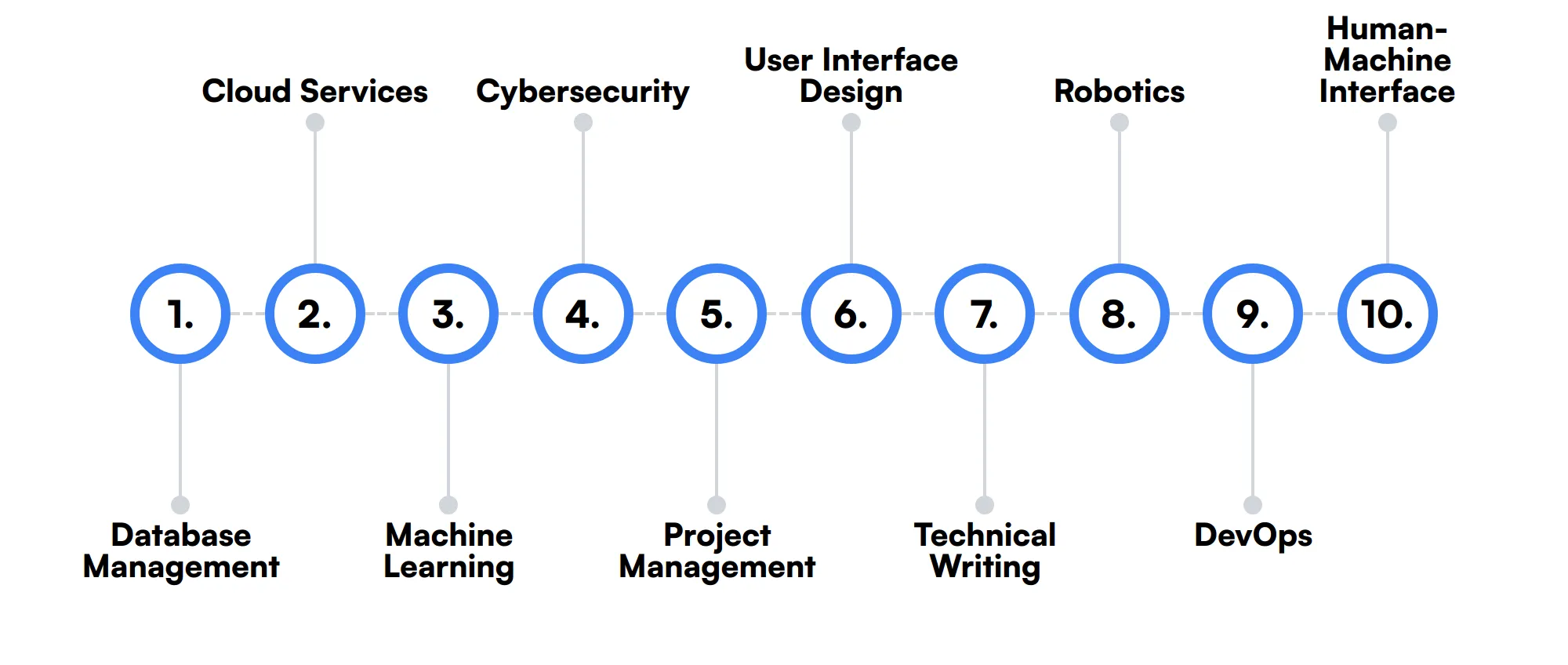
Database Management
Knowledge of database management is useful for storing and retrieving data used in automated processes. This includes understanding SQL and NoSQL databases.
Cloud Services
Familiarity with cloud services like AWS, Azure, or Google Cloud can be beneficial. Automation engineers may use these platforms to deploy and manage automated solutions.
Machine Learning
Basic understanding of machine learning can help in creating smarter automation solutions. This includes using algorithms to improve the efficiency and accuracy of automated tasks.
Cybersecurity
Awareness of cybersecurity principles is important to protect automated systems from threats. This includes implementing security measures to safeguard data and processes.
Project Management
Project management skills help in planning, executing, and monitoring automation projects. This ensures that projects are completed on time and within budget.
User Interface Design
Understanding user interface design can be helpful for creating intuitive and user-friendly automation tools. This ensures that end-users can easily interact with automated systems.
Technical Writing
Technical writing skills are useful for documenting automated processes and creating user manuals. Clear documentation helps in maintaining and troubleshooting automated systems.
Robotics
Knowledge of robotics can be advantageous for automation engineers working in manufacturing or other industries where robots are used to automate tasks.
DevOps
Understanding DevOps practices can help in automating the deployment and monitoring of applications. This includes using tools like Jenkins, Docker, and Kubernetes.
Human-Machine Interface
Familiarity with human-machine interface (HMI) design is useful for creating interfaces that allow humans to interact with automated systems effectively.
How to assess Automation Engineer skills and traits
Assessing the skills and traits of an Automation Engineer involves a nuanced understanding of both technical expertise and soft skills. Automation Engineers play a critical role in streamlining processes through technology, making it imperative to evaluate their proficiency across a range of competencies such as programming, scripting, and control systems.
Traditional methods like reviewing resumes and conducting interviews might provide a glimpse into a candidate's background, but they fall short of revealing true hands-on capabilities. To truly assess these skills, practical and scenario-based evaluations are necessary.
This is where Adaface assessments come into play. By utilizing tailored tests that cover key areas like testing frameworks, networking, and API integration, you can ensure a thorough evaluation of potential hires. Adaface tests are designed to mirror real-world problems, helping you identify candidates who are not only technically proficient but also adept at applying their knowledge practically. Learn more about Adaface assessments here. With tools like these, companies have reported an 85% reduction in screening time.
Let’s look at how to assess Automation Engineer skills with these 6 talent assessments.
Computer Programmer Coding Aptitude Test
The Computer Programmer Coding Aptitude Test evaluates a candidate's ability to solve problems using logic, analytical thinking, and programming concepts. This test is designed to assess programming fundamentals, data structures, algorithm basics, technical aptitude, and coding skills.
The test covers programming paradigms, syntax, and programming logic. Candidates are evaluated on their ability to analyze problems, identify patterns, and develop effective solutions using programming concepts. The test includes scenario-based MCQs and a coding question to gauge hands-on coding skills.
Successful candidates demonstrate a strong understanding of algorithms, data structures, and the ability to write functional code across various programming languages.
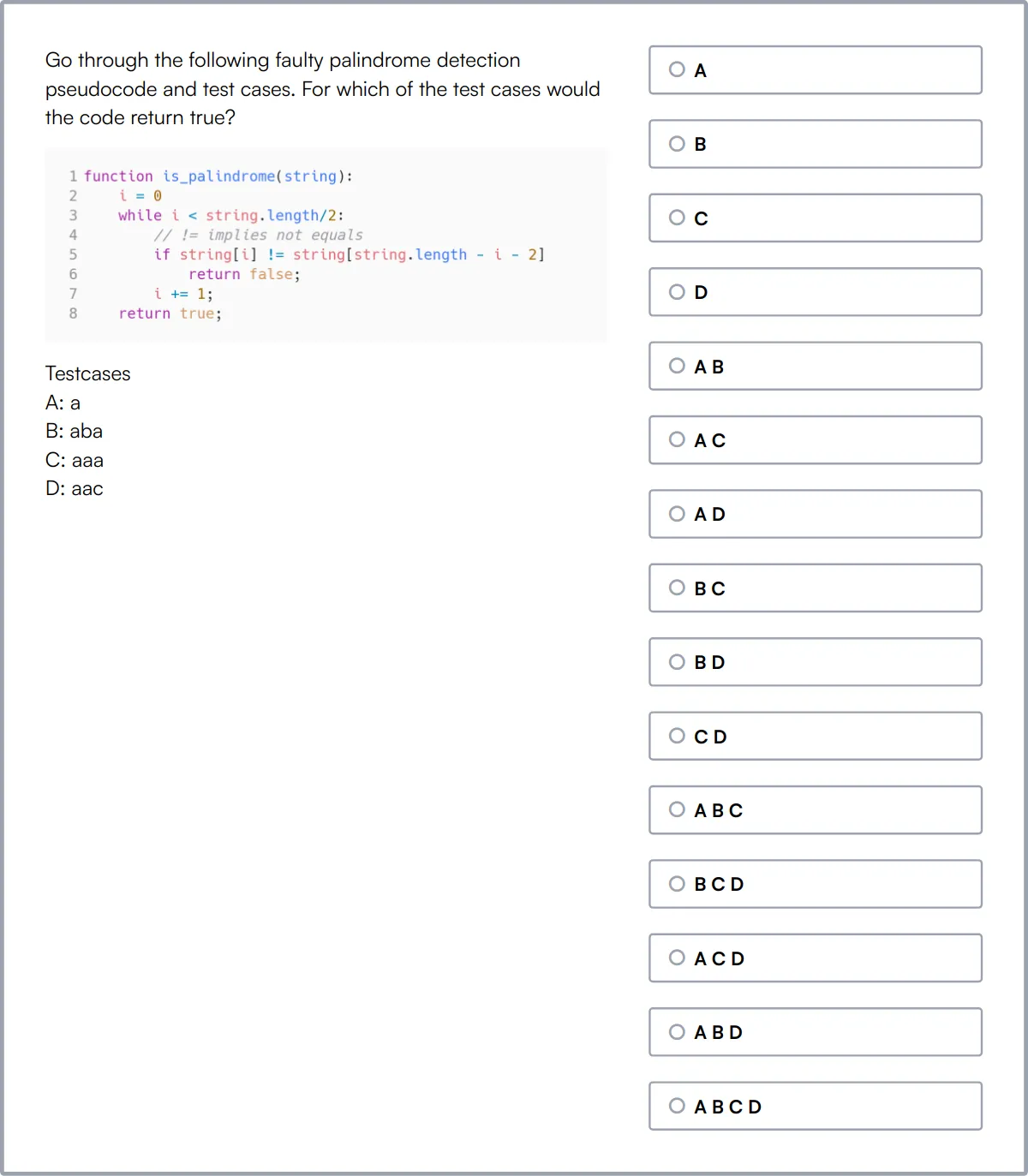
Python Online Test
The Python Online Test assesses a candidate's proficiency in Python programming. It covers Python fundamentals, data structures, error handling, file operations, scripting, web scraping, and more.
The test evaluates Python data structures (strings, lists, dictionaries, tuples), exception handling, and Object-Oriented Programming principles. It includes code-tracing and scenario-based MCQs to assess hands-on Python coding skills.
Candidates who perform well demonstrate strong debugging skills, the ability to manipulate databases, and proficiency in using Python's in-built functions and modules.
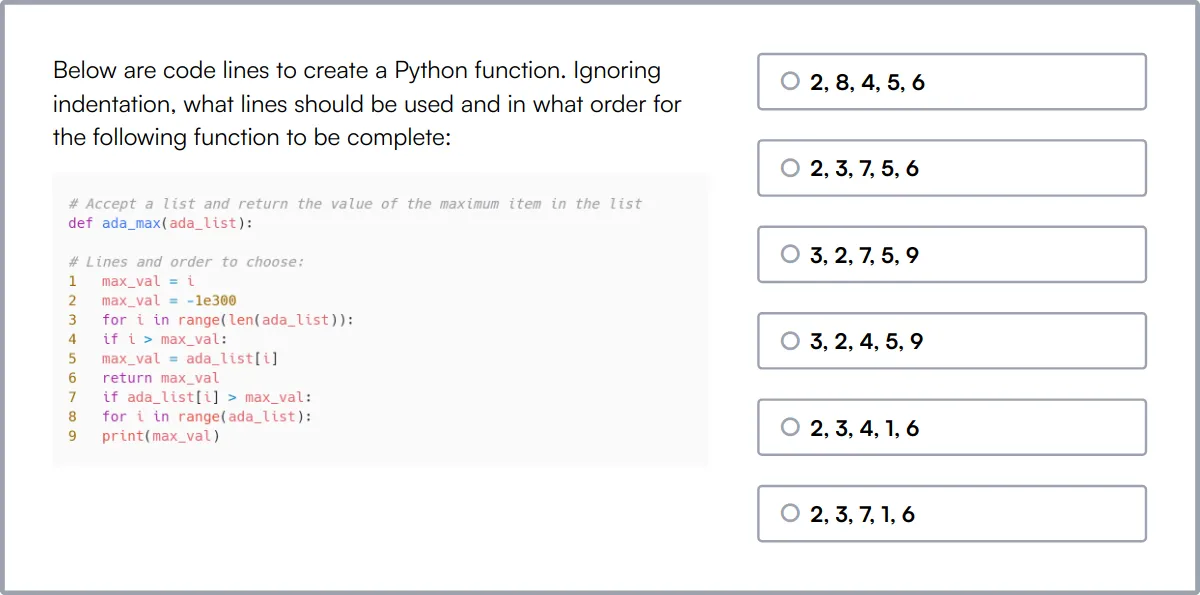
Selenium Online Test
The Selenium Online Test evaluates a candidate's ability to perform automation testing using the Selenium web driver. It covers Selenium Webdriver architecture, cross-browser testing, API testing, and framework building.
The test assesses knowledge of automation testing fundamentals, Selenium framework, and live site interaction. It includes scenario-based MCQs to evaluate the candidate's experience with Selenium Grid, data-driven frameworks, and reporting.
High-scoring candidates show proficiency in developing QA frameworks, conducting cross-browser tests, and generating insightful reports.
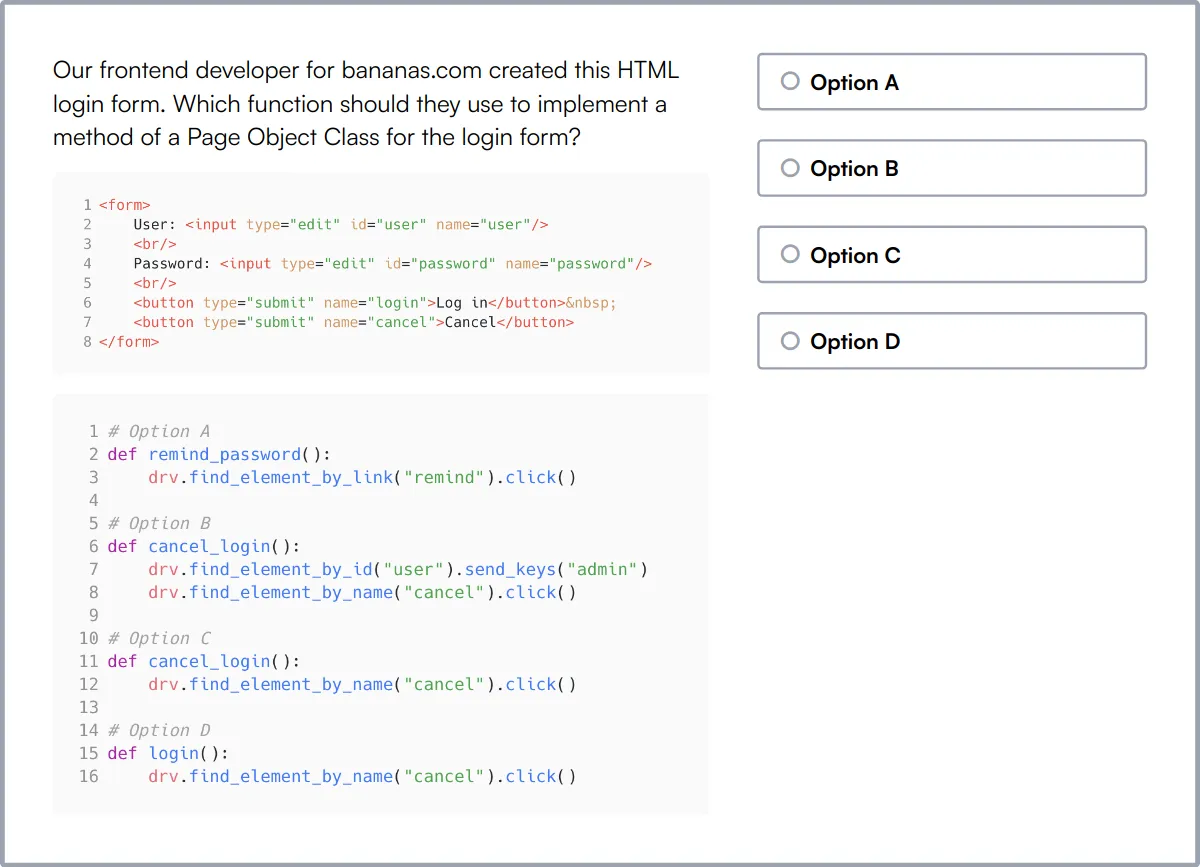
Network Engineer Online Test
The Network Engineer Online Test evaluates a candidate's technical knowledge and practical skills related to computer networking. It covers network protocols, security, routing, switching, and troubleshooting.
The test includes scenario-based MCQs to assess understanding of network architecture, IP addressing, subnetting, and WAN technologies. It evaluates the candidate's ability to design, implement, and maintain complex network infrastructures.
Candidates who excel demonstrate strong skills in diagnosing and resolving network issues, optimizing network performance, and managing network security.
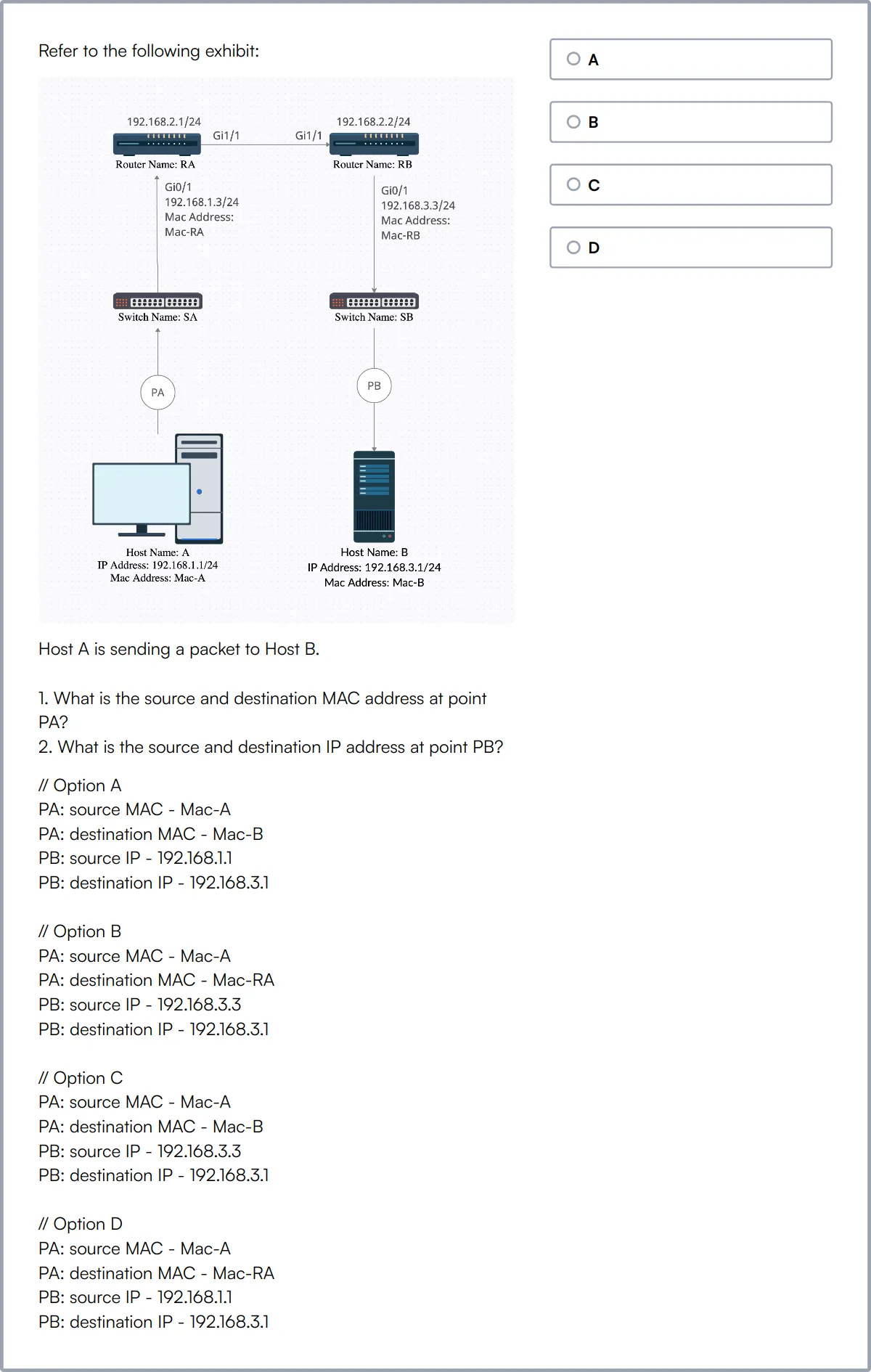
Data Analysis Test
The Data Analysis Test assesses a candidate's ability to handle, modify, analyze, and interpret data. It covers data modeling, business analysis, data interpretation, SQL, and popular data tools like Excel.
The test includes scenario-based MCQs to evaluate skills in data analysis, business analysis, data interpretation, and SQL. It screens for experience in analyzing data to find outcomes, detect anomalies, and visualize data using charts and graphs.
Successful candidates demonstrate proficiency in data queries, data operations, and the ability to extract meaningful insights from data.

Git Online Test
The Git Online Test evaluates a candidate's understanding of Git, a popular version control system. It covers Git basics, repository creation, branching, merging, and conflict resolution.
The test includes scenario-based MCQs to assess knowledge of Git commands, remote repositories, rebasing, and Git workflows. It evaluates the candidate's ability to manage source code using Git.
Candidates who perform well demonstrate proficiency in using Git to handle version control, resolve conflicts, and implement Git branching models.
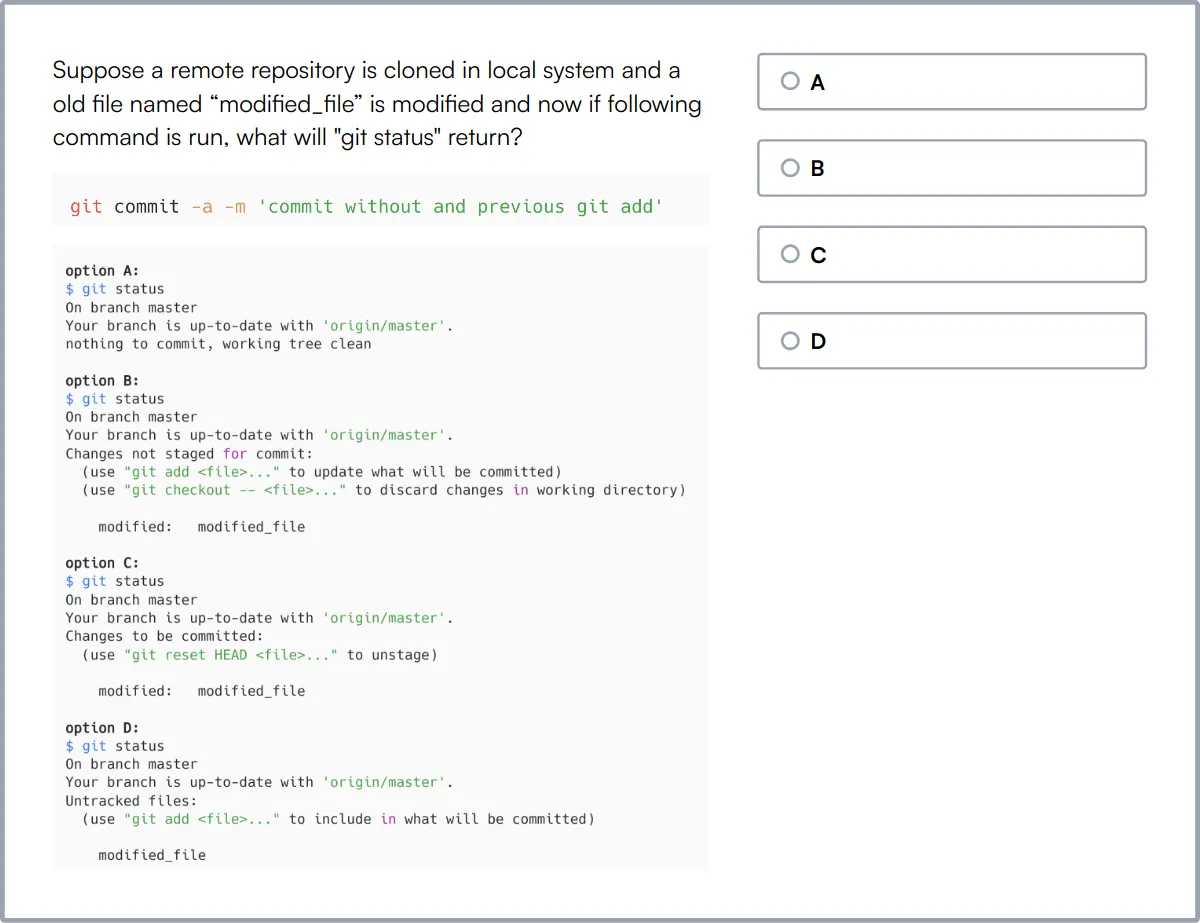
Summary: The 9 key Automation Engineer skills and how to test for them
| Automation Engineer skill | How to assess them |
|---|---|
| 1. Programming | Evaluate proficiency in writing and understanding code. |
| 2. Scripting | Assess ability to automate tasks using scripting languages. |
| 3. Control Systems | Check knowledge of designing and managing control systems. |
| 4. Testing Frameworks | Gauge skills in implementing and using testing frameworks. |
| 5. Networking | Determine understanding of network protocols and configurations. |
| 6. Data Analysis | Measure capability to analyze and interpret data. |
| 7. Version Control | Evaluate experience with version control systems like Git. |
| 8. API Integration | Assess ability to integrate and work with APIs. |
| 9. Debugging | Check proficiency in identifying and fixing code issues. |
QA Engineer Test
Automation Engineer skills FAQs
What programming languages should an Automation Engineer know?
Automation Engineers should be proficient in languages like Python, Java, and C#. These languages are commonly used for writing automation scripts and developing control systems.
How can recruiters assess scripting skills in candidates?
Recruiters can assess scripting skills by giving candidates a practical test to write or debug a script in languages like Bash, PowerShell, or Python. Reviewing past projects can also provide insights.
Why is knowledge of control systems important for Automation Engineers?
Control systems knowledge is important because it allows Automation Engineers to design and manage automated processes in manufacturing, robotics, and other applications.
What testing frameworks should Automation Engineers be familiar with?
Automation Engineers should be familiar with testing frameworks like Selenium, JUnit, and TestNG. These tools help in automating the testing process for software applications.
How can data analysis skills benefit an Automation Engineer?
Data analysis skills help Automation Engineers to interpret data from automated systems, identify trends, and make data-driven decisions to improve processes.
What role does version control play in automation engineering?
Version control systems like Git help Automation Engineers manage code changes, collaborate with team members, and maintain a history of code development.
How important is cybersecurity knowledge for an Automation Engineer?
Cybersecurity knowledge is important to protect automated systems from vulnerabilities and ensure the integrity and security of data and operations.
What is the significance of DevOps in automation engineering?
DevOps practices help Automation Engineers streamline the development, deployment, and monitoring of automated systems, ensuring faster and more reliable delivery of software.

40 min skill tests.
No trick questions.
Accurate shortlisting.
We make it easy for you to find the best candidates in your pipeline with a 40 min skills test.
Try for freeRelated posts
Free resources



